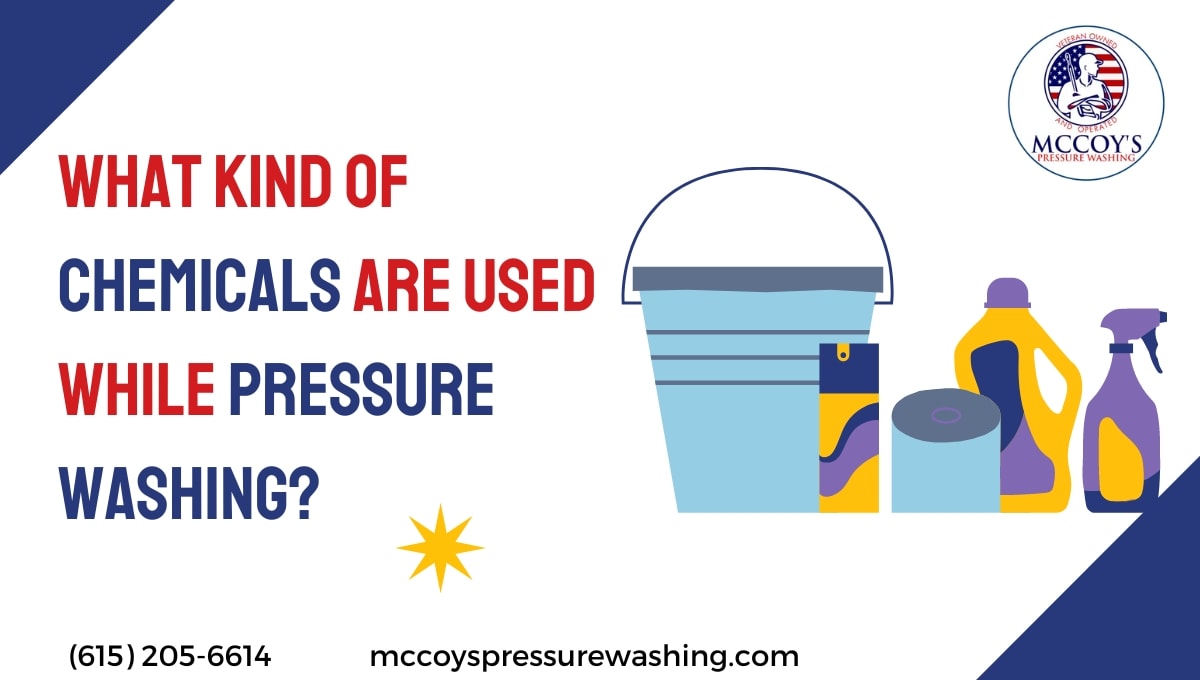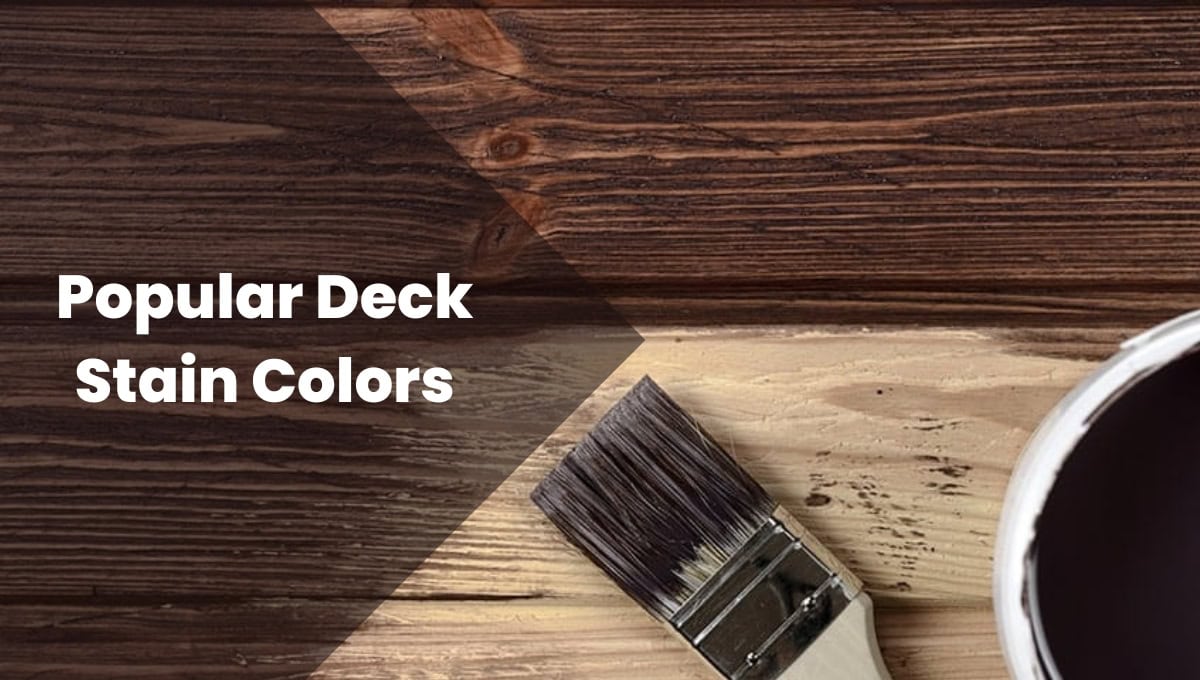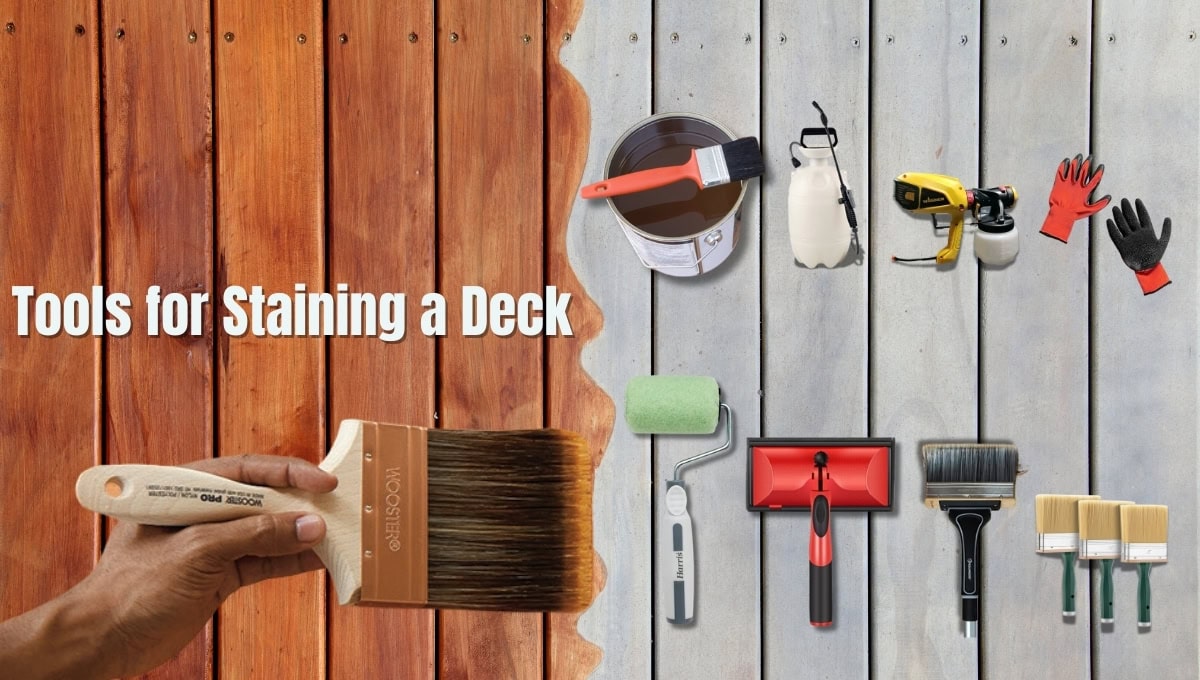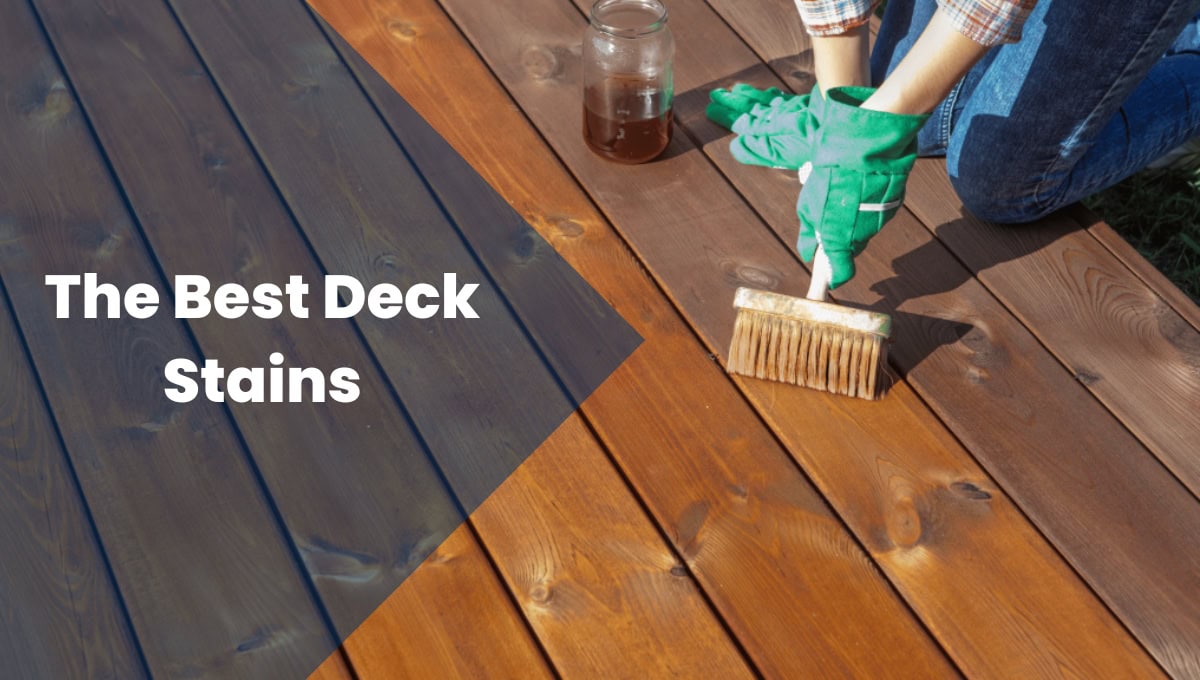Pressure washing requires more than just water and power; selecting the right cleaning agents is essential to achieve optimal results. There are various types of cleaning agents, including powerful cleaners like oxalic acid and citric acid and soapy cleaners like bleach and ammonia. These cleaning agents effectively eliminate tough stains and rust that aid in general cleaning. Each cleaning agent serves a specific purpose.
In this blog, we’ll discuss chemicals used in pressure washing, explain their functions, and provide some safety tips for using them effectively in your cleaning tasks.
Common Chemicals Used in Commercial Pressure Washing
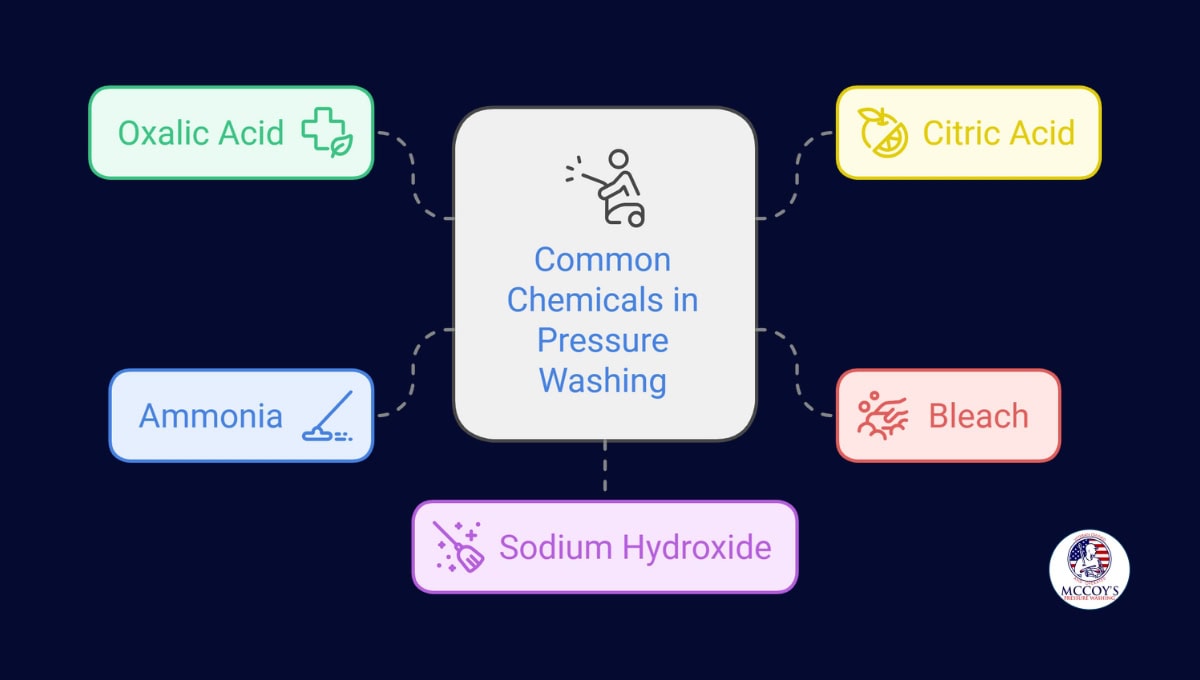
Using the appropriate chemical for specific tasks can achieve remarkable results, maintaining surfaces in pristine condition. The substances listed below are particularly helpful in rejuvenating properties:
Oxalic Acid
The washing industry widely uses oxalic acid, a potent bleaching agent derived from vegetables and fruits. This acid effectively removes stains and rust from wood and stone surfaces, making it a versatile option for pressure washing.
citric acid
When isolated and purified, citric acid is a natural and powerful bleaching agent. In addition to its bleaching properties, it can sanitize, disinfect, and combat issues like mildew, water stains, and rust on various surfaces. Citric acid is a reliable solution for achieving a spotless and refreshed appearance.
Bleach
Bleach contains sodium hydroxide and sodium hypochlorite, making it an effective sanitizer and disinfectant. However, one must exercise caution when using bleach on metals, porous woods, and delicate stones to prevent damage to these sensitive materials. By using bleach carefully, we can achieve effective cleaning while preserving the integrity of the materials.
Ammonia
Ammonia, formed by combining nitrogen and hydrogen, creates an effective alkaline cleaning solution. Despite its pungent odor, it can safely clean delicate surfaces like stainless steel and glass. Pressure washing professionals widely use ammonia due to its safety on sensitive surfaces and materials.
Sodium Hydroxide
Sodium hydroxide, or caustic potash or lye, is a major component in liquid soap production. Its light-colored composition is vital in producing various pressure-washing chemicals. Including sodium hydroxide ensures the development of effective cleaning agents for diverse surfaces.
Cleaners/Degreasers
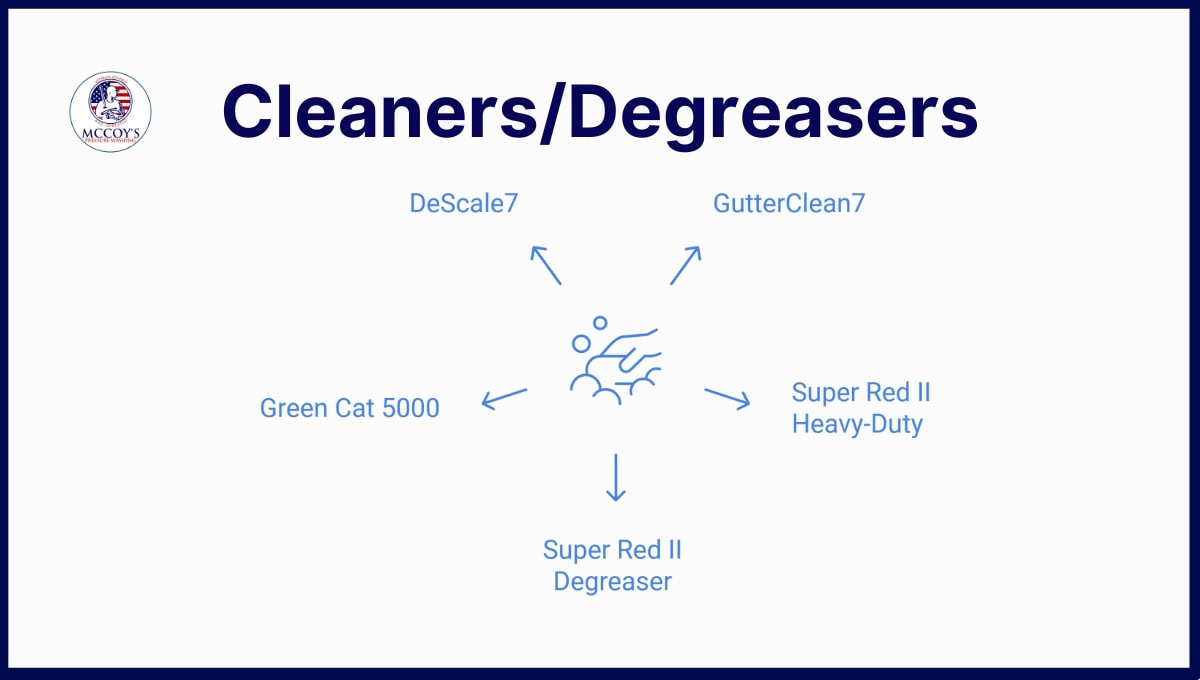
Using special cleaners or degreasers for specific needs ensures a professional approach to pressure washing. You can use the following cleaners based on your preferences:
GutterClean7
GutterClean7 is an alkaline-based cleaner designed to eliminate stubborn black streaks caused by sap, mold, oxidation, or asphalt roof shingles for aluminum gutters. You can ensure optimal cleaning results without damaging the paint by properly following the instructions on the label.
Super Red II Modified Concentrated Heavy-Duty Cleaner & Degreaser
Super Red II-modified heavy-duty cleaner and degreaser consists of a concentrated butyl degreaser that efficiently removes petroleum, oils, and greases. However, you must apply it cautiously to prevent damage to polished surfaces. Thanks to its concentrated formulation, it is the ideal solution for challenging cleaning tasks.
Super Red II Degreaser
Super Red II Degreaser is a butyl degreaser with a neutral pH value. It is versatile and suitable for both polished and painted surfaces. Its balanced composition ensures effective cleaning without compromising the integrity of the surfaces.
Green Cat 5000
Green Cat 5000 is a neutral cleaner suitable for various surfaces, making it an all-around cleaning solution. Pressure washers rely on it to clean everything from RV trailers to campers and vinyl boat seats. However, it’s important to note that Green Cat 5000 does not effectively remove barnacle growth or hard water stains.
DeScale7 Liquid Descaler
For fiberglass boats, DeScale7 Liquid Descaler provides an alternative to hydrochloric acid. It effectively removes barnacles and hard water stains. DeScale7 can be used on various surfaces, making it adaptable to diverse cleaning needs. Adhere to the usage instructions to achieve the best results while avoiding potential issues with sensitive materials.
Chemicals Used in Brick Siding
Oxalic acid is a popular cleaning agent for brick surfaces due to its high effectiveness in removing rust and red clay stains. However, it is important to exercise caution when using oxalic acid around polished, galvanized, and bare metals, as it may cause metal ions to leach into the solution. Oxalic acid typically comes in a dry form and is available in 55-lb bags. You can dissolve it in water before use for cleaning purposes.
Chemicals Used in Vinyl Siding
GutterClean7 primarily serves as an agent for cleaning aluminum gutters and helps clean vinyl siding. This alkaline-based cleaner eliminates black streaks from tree sap, mold, oxidation, or asphalt roof shingles. It is important to follow the instructions mentioned on the label while using this cleaner to avoid any harm to the paint.
Chemicals Used in Deck Cleaning
Super Red II Modified Concentrated Heavy-Duty Cleaner & Degreaser is a concentrated butyl degreaser suitable for deck cleaning. It effectively removes petroleum, oils, and greases that may accumulate on decks. However, it is important to exercise caution and avoid using it on polished aluminum surfaces as it may remove the polish.
Chemicals Used in Concrete Surfaces
Hydrochloric acid is a cleaning agent commonly used for cleaning newly built brick and concrete surfaces, both old and new. It effectively eliminates mortar and various types of stains on concrete surfaces. However, we don’t recommend using it on decorative or stamped concrete surfaces. You should be careful if you use it on dark-colored brick, as it may cause streaks. Alternative descaling solutions, such as DeScale7, can also be utilized.
Chemicals Used in Fence Cleaning
Proper fence cleaning requires the right chemicals to ensure effective results without damaging the material. Green Cat 5000 is a versatile, neutral cleaner ideal for cleaning various finished surfaces, including fences. It works well on materials like painted surfaces and vinyl, making it a reliable choice for maintaining the appearance of your fence. However, it’s not suitable for addressing tougher cleaning challenges, such as barnacle growth or hard water stains. In such cases, some homeowners turn to a homemade fence cleaning solution as an eco-friendly alternative for tackling grime, algae, and mildew.
Safety and Precaution Before Pressure Washing
Following the manufacturer’s guidelines for each chemical to ensure personal safety while using a pressure washer is important. It is necessary to take proper safety precautions, such as wearing protective gear and following dilution instructions.
Here are some safety precautions that you must take while using a pressure washer:
Protective Gear:
- Protect your eyes by wearing safety goggles or glasses.
- Use ear protection if the equipment creates a loud noise.
- Choose closed-toe shoes with good traction to avoid slip and fall accidents.
Appropriate clothing:
- Wear waterproof clothing.
- Cover your arms and legs with long sleeves and pants.
Understand Your Equipment:
- Read and understand the pressure washer manual.
- Perform test sprays on a small area before actual cleaning.
Choose the right nozzle:
- Use adjustable nozzles according to the clean surface.
- Generally, wide-angle nozzles are safer.
Check for hazards:
- Inspect the area for obstacles and fragile items.
- Avoid pressure washing near electrical areas.
Chemical Precautions:
- Read and follow instructions on chemical labels.
- Work in well-ventilated areas when using chemicals.
Keep a safe distance:
- Maintain a safe distance from the cleaning surface.
- Use extension wands if needed.
Secure ladders:
- Place ladders on stable and level surfaces.
- Have a spotter to hold ladders steady.
Power and water sources:
- Plug the pressure washer into a GFCI outlet.
- Ensure a secure connection to the water source.
McCoy’s Deck Staining and Pressure Washing uses various chemicals depending on their clients’ specific cleaning needs. Common chemicals include detergents, degreasers, bleach, and specialized cleaners designed for surfaces such as concrete, wood, or siding. These chemicals are chosen based on their effectiveness in removing dirt, grime, mold, mildew, and other stains while ensuring the safety of the cleaned surfaces and the surrounding environment.
Our Brentwood pressure washing service provides proper safety protocols and guidelines for handling and disposing of these chemicals to minimize any potential environmental impact and ensure the safety of our employees and customers.
To know more about our process, contact us for a free estimate.
FAQs on Chemicals used in Commerical Pressure Washings
What are the two main cleaning agents used in pressure cleaning?
The two main cleaning agents commonly used in pressure cleaning are alkaline and acidic cleaners. Alkaline cleaners typically contain sodium hydroxide and effectively eliminate grime and grease. On the other hand, acidic cleaners, such as oxalic acid or citric acid, are ideal for addressing rust and mineral deposits on surfaces.
What is the best chemical when pressure-washing concrete?
Oxalic and citric acids are the best chemicals for general cleaning. However, when pressure washing, specialized concrete cleaners may be necessary to remove oil or grease stains.
What is the best cleaner to use in a pressure washer?
The best cleaner for a pressure washer depends on the specific cleaning task. Versatile all-purpose cleaners like GutterClean7 or Green Cat 5000 are suitable options. In contrast, specialized cleaners like DeScale7 Liquid Descaler or Super Red II Modified target specific issues, such as hard water stains or heavy-duty degreasing.
Should I seal my driveway after pressure washing?
After pressure washing, applying a sealant helps protect the driveway’s surface from moisture, UV damage, and other environmental factors. It also helps prolong the driveway’s lifespan by preventing cracks, fading, and deterioration. Choose a high-quality sealant specifically designed for use on driveways and follow the manufacturer’s instructions.
What are the most effective chemicals for cleaning driveways?
Sodium hydroxide-based cleaners or bleach solutions are commonly effective. However, the optimal choice of chemical may vary depending on the stains or contaminants on the driveway.

